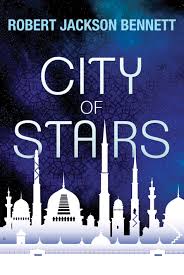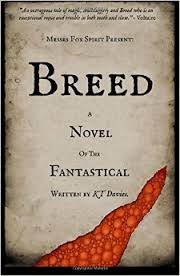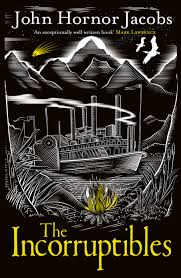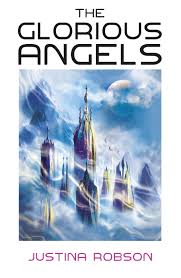Other People's Trumpets part (x)
I have, I think, gone on about Children of Time (1) quite long enough. Suffice to say, it has had some lovely reviews, and I truly hope it does well. I release you, oh little spider, out the window of publishing!
Time to talk about some stuff I have been reading, that I think is rather good and deserves to be better known. My personal reading tastes value originality of concept in fantastical literature, and so here are a quartet of books which tick that box and are also, one and all, very enjoyable reads.
 Firstly, let's talk about Robert Jackson Bennett, whom I had the pleasure of being on a panel with at Loncon 3, talking about the interrelation of magic and technology in fantasy. I have, far later than I should, got round to reading his City of Stairs, and I can report that it is both excellently written and enormously original — and thought-provoking. It also sits in a part of the fantastical morphogenetic space not a million miles away from Shadows of the Apt, and I rather think that my readers in particular might appreciate Bennett's world (and hopefully vice versa). The concept is that there were gods on the Continent, and they were both physically present and pretty much all-powerful, able to create fantastic creatures, raise buildings, prevent disease, transform people, all the usual. There was also a land called Saypur which had no gods to protect it, and this land was enslaved by the followers of the divine, and suffered greatly, until a hero arose and found a way to kill the gods. Which sounds pretty straightforward, good and evil-wise, but that's not the half of it. City of Stairs takes place many generations later, when the Continent is still trying to recover from the colossal blow of losing their gods — because most of the gods' works (including entire city districts) vanished when they died, and most of the rest was destroyed or suppressed by the Saypuri — and also, whilst the Saypuri had things like medicine, say, the people of the Continent had been used to divinely mandated health, and so plagues ravaged the land and devastated the population. And now the Continent struggles on under a Saypuri administration that expressly forbids any mention of or reference to the departed divinities, a prohibition strictly enforced by law. So the Saypuri are the bad guys…? Except the lost world of the gods was plainly rather horrible to be a part of — one of the gods was a mad Leviticus-style lawmaker, for example, savagely punishing any transgression of its meaningless tenets. Except the lost world was plainly rather wonderful too — living cities, enchanted items, all that jazz. Bennett conjures up a world that is very complex both historically and morally — he deals with religion, with race, with sexuality, and his style is enormously engaging.
Firstly, let's talk about Robert Jackson Bennett, whom I had the pleasure of being on a panel with at Loncon 3, talking about the interrelation of magic and technology in fantasy. I have, far later than I should, got round to reading his City of Stairs, and I can report that it is both excellently written and enormously original — and thought-provoking. It also sits in a part of the fantastical morphogenetic space not a million miles away from Shadows of the Apt, and I rather think that my readers in particular might appreciate Bennett's world (and hopefully vice versa). The concept is that there were gods on the Continent, and they were both physically present and pretty much all-powerful, able to create fantastic creatures, raise buildings, prevent disease, transform people, all the usual. There was also a land called Saypur which had no gods to protect it, and this land was enslaved by the followers of the divine, and suffered greatly, until a hero arose and found a way to kill the gods. Which sounds pretty straightforward, good and evil-wise, but that's not the half of it. City of Stairs takes place many generations later, when the Continent is still trying to recover from the colossal blow of losing their gods — because most of the gods' works (including entire city districts) vanished when they died, and most of the rest was destroyed or suppressed by the Saypuri — and also, whilst the Saypuri had things like medicine, say, the people of the Continent had been used to divinely mandated health, and so plagues ravaged the land and devastated the population. And now the Continent struggles on under a Saypuri administration that expressly forbids any mention of or reference to the departed divinities, a prohibition strictly enforced by law. So the Saypuri are the bad guys…? Except the lost world of the gods was plainly rather horrible to be a part of — one of the gods was a mad Leviticus-style lawmaker, for example, savagely punishing any transgression of its meaningless tenets. Except the lost world was plainly rather wonderful too — living cities, enchanted items, all that jazz. Bennett conjures up a world that is very complex both historically and morally — he deals with religion, with race, with sexuality, and his style is enormously engaging.
 Next up: Breed by KT Davies. I was enormously impressed by KT's heroic fantasy The Red Knight, which came out a while ago. Breed is a very different beast, and I think I like it even better. It's a fantasy about thieves, in the Lieber-Lynch-Tallerman-Hulick sense, but in a high-magic, high humour way — it's not an out-and-out comedy in the Pratchett vein, but the titular first-person narrator has a cheerfully pragmatic tone that's easy to laugh along with, even when things are going extremely badly for the larcenous hero(/ine — as Breed is never actually gendered). Breed is a half-human rogue in a word replete with dragons, demons, magicians and non-human races — the setting really is good old fantasy, but with a lot of the tropes turned upside down and inside out. The book rattles along at top speed as the protagonist sprints through robberies, escapes, botched assassinations, more escapes, rival sects of magical monks, demonic influence, yet more escapes, political intrigue and, my personal favourite, a mosquito-man dandy and sharpshooter. Breed is a swift, fun read in a light, pulpy style that you don't get all that much of in fantasy, and hopefully there will be more of the rogue's adventures from Davies at some point down the line.
Next up: Breed by KT Davies. I was enormously impressed by KT's heroic fantasy The Red Knight, which came out a while ago. Breed is a very different beast, and I think I like it even better. It's a fantasy about thieves, in the Lieber-Lynch-Tallerman-Hulick sense, but in a high-magic, high humour way — it's not an out-and-out comedy in the Pratchett vein, but the titular first-person narrator has a cheerfully pragmatic tone that's easy to laugh along with, even when things are going extremely badly for the larcenous hero(/ine — as Breed is never actually gendered). Breed is a half-human rogue in a word replete with dragons, demons, magicians and non-human races — the setting really is good old fantasy, but with a lot of the tropes turned upside down and inside out. The book rattles along at top speed as the protagonist sprints through robberies, escapes, botched assassinations, more escapes, rival sects of magical monks, demonic influence, yet more escapes, political intrigue and, my personal favourite, a mosquito-man dandy and sharpshooter. Breed is a swift, fun read in a light, pulpy style that you don't get all that much of in fantasy, and hopefully there will be more of the rogue's adventures from Davies at some point down the line.
 John Horner Jacobs was another American visitor I met last year — at Nine Worlds in fact, where he provided the appropriate accent for a character in Stark Holborn's reading of her Nunslinger. Appropriately enough, Jacobs is also a western writer, of a kind. The Incorruptibles is a tale of the fantastic West as seen through a distorted alt-history lens. The sort-of New World has been colonised by an updated Roman Empire fuelled by an industry that runs on demons — even down to the individual bullets in a gun. Jacobs takes, breaks and reforges various fantasy staples — his dwarves are a subjugated race, slaves and servants to the Romans (the narrator is one such, serving as 'native tracker' for them) while the elves are terrifying elemental forces — murderous and hostile and almost impossible to kill. Throw in Roman foreign policy, the terrible trade of the demon-binding engineers and a traditionally stoic gunfighter, and it's a very enjoyable book, definitely one I'll be grabbing the sequel to.
John Horner Jacobs was another American visitor I met last year — at Nine Worlds in fact, where he provided the appropriate accent for a character in Stark Holborn's reading of her Nunslinger. Appropriately enough, Jacobs is also a western writer, of a kind. The Incorruptibles is a tale of the fantastic West as seen through a distorted alt-history lens. The sort-of New World has been colonised by an updated Roman Empire fuelled by an industry that runs on demons — even down to the individual bullets in a gun. Jacobs takes, breaks and reforges various fantasy staples — his dwarves are a subjugated race, slaves and servants to the Romans (the narrator is one such, serving as 'native tracker' for them) while the elves are terrifying elemental forces — murderous and hostile and almost impossible to kill. Throw in Roman foreign policy, the terrible trade of the demon-binding engineers and a traditionally stoic gunfighter, and it's a very enjoyable book, definitely one I'll be grabbing the sequel to.
 Finally, The Glorious Angels by Justina Robson. This is more of a SF book, but SF written in the fantastical style like Wolfe's Book of the New Sun. Robson gives us a world of vast mobile cities ruled by mindlinked empresses, a female-led society full of political machinations, technology bound to individual bloodlines (and at that point the reader begins to realise that some very weird stuff lies in the past to have led to this society), and a war with the enigmatic, non-human Karoo over an archaeological treasure trove that turns out to be far more than anyone has bargained for. The joy of Angels — aside from Robson's always-elegant style — is the complexity of the society and its characters, which are beautifully realised and give us a kaleidoscope of viewpoints and relationships, a richness that spec fic often fails to yield. I particularly like the Karoo, because while they are extremely alien, in what they are, what they look like, and especially what they want, we also get one as a POV character, and Robson is a master at making the inhuman comprehensible to a human reader.
Finally, The Glorious Angels by Justina Robson. This is more of a SF book, but SF written in the fantastical style like Wolfe's Book of the New Sun. Robson gives us a world of vast mobile cities ruled by mindlinked empresses, a female-led society full of political machinations, technology bound to individual bloodlines (and at that point the reader begins to realise that some very weird stuff lies in the past to have led to this society), and a war with the enigmatic, non-human Karoo over an archaeological treasure trove that turns out to be far more than anyone has bargained for. The joy of Angels — aside from Robson's always-elegant style — is the complexity of the society and its characters, which are beautifully realised and give us a kaleidoscope of viewpoints and relationships, a richness that spec fic often fails to yield. I particularly like the Karoo, because while they are extremely alien, in what they are, what they look like, and especially what they want, we also get one as a POV character, and Robson is a master at making the inhuman comprehensible to a human reader.
(1) Available from all good bookshops. And some frankly rather seedy ones.
 © 2008-2025 Pan Macmillan
© 2008-2025 Pan Macmillan
Justina owes you. I've been hovering over buying and your rec (plus the £1.99 kindle offer) pushed me over. The incorruptibles has been sitting on my read list for a while. It's finding the time but better there's too much than too little